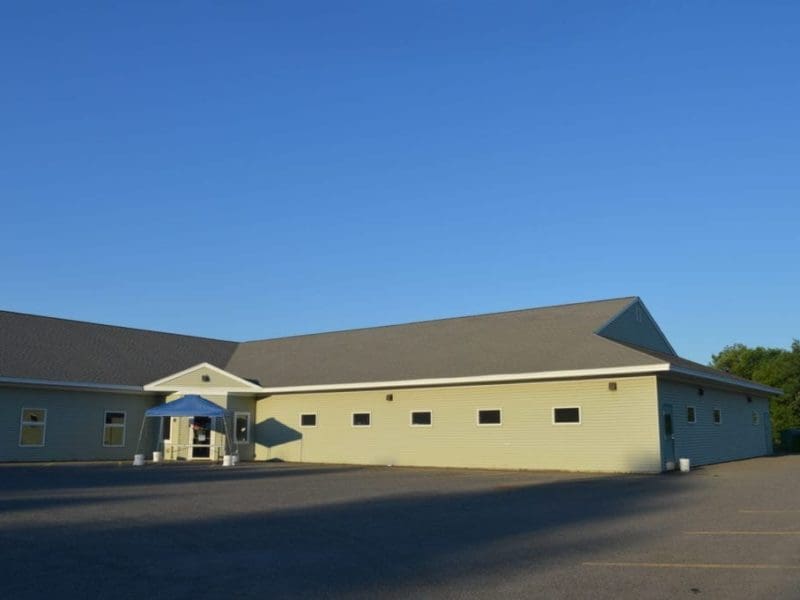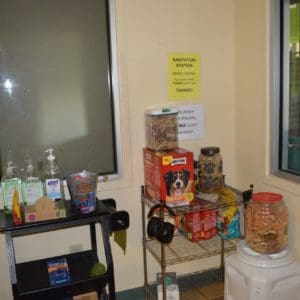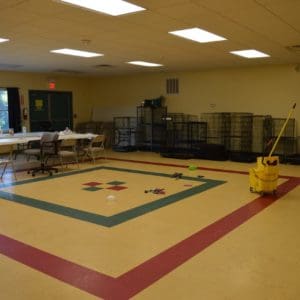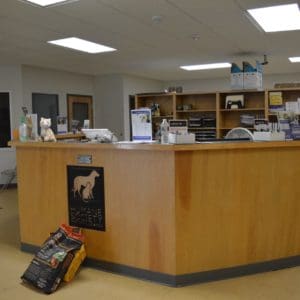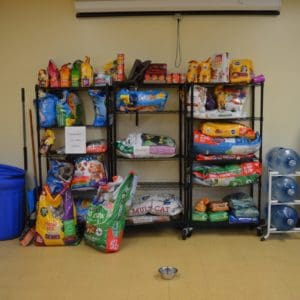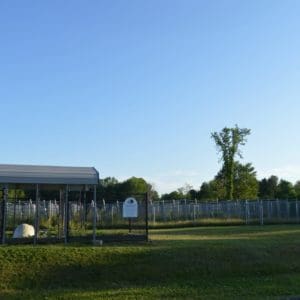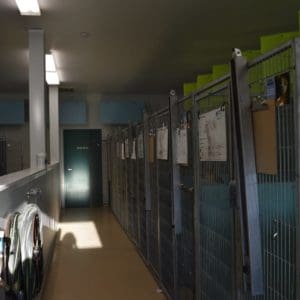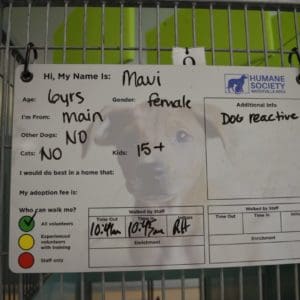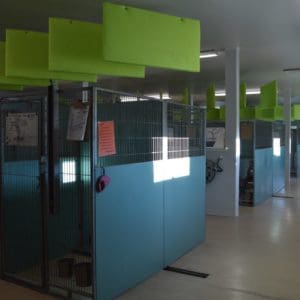The Humane Society Waterville Area (HSWA) shelter in Maine has been in operation since 1970. Located behind LeFleur Airport in Waterville, about three hours from Boston and visible from Interstate 95, the building has two main wings: one dedicated to dogs, the other to cats and small animals. In between are two rooms used as reception areas and meeting spaces, doubling as exercise rooms during the winter. The shelter also serves as a pet food bank.
In-Person Visits Continue During Pandemic
When The Canine Review visited the shelter in late June, it was closed to the general public due to the ongoing COVID-19 pandemic. Executive director Lisa Oakes says that starting March 24th, HSWA began asking prospective adopters to schedule appointments online before visiting the shelter in-person. In-person visits continue to take place by appointment only.
“I’m not sure how long that’s gonna last,” Oakes, said of the closure. “I don’t want to jump the gun and open too soon. I’d rather be safe than sorry.”
Shelter Space
The kennel space appeared clean and was illuminated by natural light pouring in from the windows lining all exterior walls. The kennel was painted in a bright teal color, contrasted with bright green soundproofing pads hanging above the kennel cages. The shelter was quiet and kept at a cool temperature, despite the early evening heat lingering outside. Due to the shelter’s temporary closure to the public, The Canine Review did not interact with any volunteers, staff, or visitors; only Ms. Oakes and an air conditioning repairman were on site.
Kennels are separated into multiple rooms. Three isolation kennels and 12 kennels intended for strays are not accessible to the public. Adoptable dogs are housed in 21 kennels in a separate room. All kennels have the capability to be broken down into smaller kennels to accommodate puppies and smaller dogs, if needed, according to Oakes. The amount of time a dog spends at the shelter averages 34 days, according to 2019 data Oakes retrieved from PetPoint, the shelter management software HSWA uses.
‘We can’t use any of those kennels outside…’
The shelter sits on about 19 acres, allowing for on-property walks, and outdoor kennels for dogs to exercise without risk of running away. Oakes pointed to issues with the infrastructure that she inherited when stepping into her role at the helm of the shelter two years ago that she plans on addressing.
“We can’t use any of those kennels outside…because the ground that this whole place is built on is really marshy and all the concrete underneath holding the fencing up, it shifts…and they can just tunnel right under,” Oakes said. “So, right now, we’re looking at probably a capital campaign to really get those built properly, and rebuilt, and redesigned.”
‘None of the people that were involved with that are at the shelter anymore.’
Oakes says that she began in her current role at the shelter’s helm on a voluntary basis in late 2017, following her predecessor’s resignation. The resignation, Oakes explained, came after two shelter pit bulls escaped and killed a neighborhood dog. The pitbulls, which were ordered to be euthanized by a judge, were never found after the attack. “None of the people that were involved with that are at the shelter anymore,” Oakes said. “We were able to keep the shelter open,” Oakes said of the work the shelter put in following the controversy. “We raised this money; the community came together.” From 2017 to 2018, the shelter saw an increase of $240,321 in contributions and grants, according to the 990s filed for those respective years
‘Proud of the Team’
“I’m really proud of the team that we’ve been able to build,” Oakes said, when asked what she was most proud of with regard to her work at the shelter “We’ve worked really hard to create a really solid group of people that really care about the animals.”
There were eleven dogs present in the adoption kennel when TCR visited. Oakes said the shelter had 46 dogs in its care, including fosters, which account for over 80% of all pets with HSWA, and strays not ready for adoption.
HSWA Volunteer Programs
HSWA is probably more reliant on its volunteer programs than larger shelters with more funding. Two examples of volunteer programs that provide critical infrastructure are ‘Doggy Day Trips’ and ‘Slumber Pups.’
The Doggy Day Trips program, which was launched in 2019, allows volunteers to take shelter dogs on one-hour to afternoon-length trips.
“The Doggy Day Trips have been the best thing on the planet,” Oakes said. “Because we don’t even have time to take dogs out in a car. So, we don’t know how they are in a car. Maybe they get carsick, maybe they love hanging their tongue out the window. And so, this gives us not only information insight into their behavior, it gets them out of the shelter.”
In February 2020, HSWA introduced the Slumber Pups program, which facilitates short-term fosters. Volunteers are able to keep dogs for between one and two nights.
Slumber Pups has been suspended since March 24th due to the pandemic; however, Doggy Day Trips remains in operation, according to an update on HSWA’s Facebook page. Volunteers for both programs are required to apply, partake in orientations, and fill out waivers, according to HSWA’s website.
Intake Procedures
HSWA is an open admission shelter, and contracts with 24 local municipalities.
“I mean, we try to dissuade people from dropping off their dog that has bitten the neighbor’s kid,” Oakes says. “We try to work with folks so that they will make the decision on their own,” she added. “So they don’t leave a dangerous dog here and then we have to euthanize them, if it’s that kind of situation, we tend to work with folks to help them through the process because it’s not an easy decision in that kind of case.”
HSWA allows the dog a few days to decompress and get used to the shelter following its arrival. All dogs receive full physical examinations, are spayed or neutered, microchipped, and brought up-to-date on vaccines and treatments. HSWA does not employ a full-time veterinarian, instead bringing all dogs in the shelter’s care to area veterinary hospitals or other shelters in the state with veterinary services.
Oakes said the shelter is taking active steps to adjust their approach to temperament testing: “We’re switching to a more overall, just sitting with the dog and not trying to poke it to see what pisses it off,” Oakes said. “We’re moving towards really observing the dog and playing with the dog and see what might trigger them and what might not.”
According to Oakes, all shelter staff received behavioral training from Dr. Christine Calder DVM DACVB, a veterinary behaviorist based in Brunswick, Maine in mid-June. “It’s kind of going away from the ‘take a fake hand and poke it at the dog to see if it bites it’,” Oakes said. “It’s like ‘Here. Do you like this bowl of food, what if I take it away from you?’ I’d be mad if someone did that!”
There is no full-time certified trainer on staff, though Jackie LaRochelle, owner of Puppies Pause Training, is on the shelter’s Board of Directors. LaRochelle offers services to the shelter, including behavioral assessments and training classes at the shelter, according to Oakes.
Adoption Process and Requirements
Applications are available on HSWA’s website. All applicants must be 18 years of age or older, and provide veterinary and landlord references if applicable. There is a 24-hour wait period for the shelter to assess the application. HSWA does not hold dogs for potential adoptees. Oakes says that those unsure of adopting are encouraged to foster a dog to see if the home is a good match. Those wishing to visit the shelter in-person must request an appointment online before coming in due to the shelter’s temporary social distancing guidelines. Before the pandemic restrictions were in place, people wanting in-person visits were allowed to go to the shelter at any time during business hours.
Applicants are asked to bring any other dogs in the household and as many family members as possible to meet the dog before following through with an adoption. Adoption fees for dogs range from $125 to $350 for individual adoptions, with discounts offered for adopting multiple dogs. HSWA’s website lists slightly higher prices for dogs transported from outside of the area and does not offer discounts for adopting multiple transported dogs.
By The Numbers
78 dogs were brought in as strays and 128 were relinquished by owners in 2018. 13 dogs were in the care of HSWA at the beginning of January 2018. A total of 117 dogs were adopted in 2018 with 17 still in the shelter’s care, and no dogs died in care or were euthanized.
HSWA reported 478 dogs in their care in 2017, with 645 dogs reported adopted. Four dogs died in care, and 12 were euthanized.
HSWA’s 990 form filed for 2018 shows the shelter’s total assets were $957,738, down $116,468 from the year prior. Its total expenses were $703,201, up $94,516 from the year prior. The total revenue for 2018 was $682,051. Over 78% of that revenue came from $533,696 of contributions and grants, an increase of $240,321 from 2017.
Tax Form 990’s 990s; 2011 through 2018
Annual Reports:
Outcome Data:
https://hswa.org/wp-content/uploads/2019/11/2018-Report.pdf
https://hswa.org/wp-content/uploads/2019/11/2017-Report.pdf
https://hswa.org/wp-content/uploads/2019/11/2016-Report.pdf
100 Webb Rd.
Waterville, ME 04901

